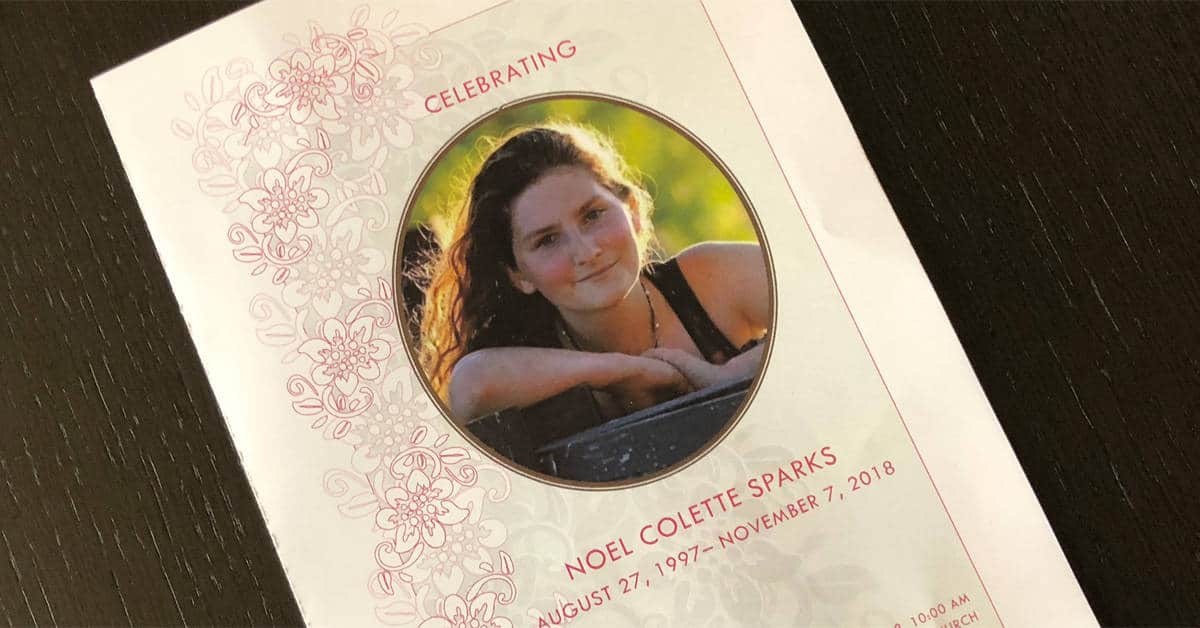 By Wayne Jacobsen
By Wayne Jacobsen
BodyLife • November 1999
The forest fire had been brought under control, and the group of firefighters were working back through the devastation making sure all the hot spots had been extinguished. As they marched across the blackened landscape between the wisps of smoke still rising from the smoldering remains, a large lump on the trail caught a firefighter’s eye.
As he got closer he noticed it was the charred remains of a large bird, that had burned nearly half way through. Since birds can so easily fly away from the approaching flames, the firefighter wondered what must have been wrong with this bird that it could not escape. Had it been sick or injured?
Arriving at the carcass, he decided to kick it off the trail with his boot. As soon as he did, however, he was startled half to death by a flurry of activity around his feet. Four little birds flailed in the dust and ash then scurried away down the hillside.
The bulk of the mother’s body had covered them from the searing flames. Though the heat was enough to consume her, it allowed her babies to find safety underneath. In the face of the rising flames, she had stayed with her young. She was their only hope for safety, and willing to risk her own life she gathered them under her body and covered them with herself. Even when the pain reached its most unbearable moment, when she could easily have flown away to start another family on another day, she made herself stay through the raging flames.
Her dead carcass and her fleeing chicks told the story well enough—she gave the ultimate sacrifice to save her young. It also illustrates an even greater story—this one almost incomprehensible. In this story it is the Creator of heaven and earth who does exactly the same thing to rescue his wayward children from their own destruction.
The Worst Curse
Jesus was surrounded by his most hostile audience. No one gave him more trouble than the elders and Pharisees in Jerusalem. Their only priority seemed to be protecting their position in society, and trying to deal with this miracle-working teacher with a mix of disdain one moment and feigned support when they were afraid of the people. To say they were the most disingenuous people he dealt with would be an understatement. They were always covering up their real motives and actions to act a holiness they did not know.
In his final words to the city of Jerusalem, only days before his death, he exposes them for what they really are—hypocrites who turned the work of the loving God into a religion they manipulated for their own gain and sense of self-importance. Eight times he pronounced a curse on them, “Woe to you scribes, Pharisees and hypocrites.” Five more times he calls them blind guides, or blind Pharisees.
He exposed them for keeping people from the reality of the kingdom; for making converts they only lured into greater bondage; for skewed priorities; for pretending to be righteous on the outside when evil raged within, for glorifying the prophets of the past and rejecting the prophets of their day.
The last charge was serious indeed. “You brood of vipers,” Jesus called them, “how do you think you will escape the sentence of hell?” In the days ahead God would send his messengers again to them, but they would torture and kill them. Jesus warned them that because of their deeds upon them would “come the guilt of all the righteous blood that has been shed on earth.”
What a curse! He made them responsible for the murder of every righteous person since the day Cain slew his own brother Abel. He could already see the consequences bearing down on them like a firestorm of wrath, seeking to consume them in their sin.
Don’t these words seem so completely out of character for Jesus? His message of love and forgiveness had captured the land, inviting to himself some of the most sinful people of his day. Yet these religious leaders he condemned in the cruelest of terms. Had he utterly rejected them?
That’s what it appears on the surface, but look closer. Rather than taking delight in their coming devastation, he offered to risk his life to take part in their rescue. In words both poetic and poignant he makes them an incredible offer.
Under His Wings
“O Jerusalem, Jerusalem, you who kill the prophets and stone those sent to you, how often I have longed to gather your children together, as a hen gathers her chicks under her wings, but you were not willing.”
They had rejected God and the messengers he had sent. They had earned the harshest of sentences for their actions and yet Jesus still wanted to draw them to himself and bear the destruction for them. Their city would be conquered and their children devastated by the consequences of living to their own selfishness instead of trusting in the Living God.
Jesus invoked the same image the firefighter had seen in the woods. He presented himself as a hen trying to gather chicks to herself. That only happens when danger presses in upon them. A hen doesn’t nurse her children or cuddle them to sleep. But when a predator comes near or the coop catches on fire she will try to gather them under her wings. Pulling them beneath her she will cover them with her body, risking her own life for their safety.
Jesus could see the firestorm their own sin had produced approaching Jerusalem. It would devour them utterly. Even though many in that crowd would cry for his crucifixion only a few days later, he still wanted them. Like the hen, he offered them a safe place under his wings, willing to endure the fire to the point of death to rescue whoever wanted to come.
When it would have been so easy for him to abandon them to the fate we deserved, he was going to stay and meet the approaching fire in its full fury. What must it take for a bird to stay over her babies as the fire draws ever-closer, then begins to sear her neck and back? What must it have taken for the God himself to endure the fury of the wrath our sins deserved and stay through it to the end so that those under his wing might be saved.
“But you were not willing.” The story’s end was tragic for those who stood around Jesus that day. Unwilling to come to him they would have to endure the fire themselves to its tragic end. I doubt there are words that break Father’s heart more than these. After all I’ve done to deliver you from the ravages of sin, you were unwilling.
Not all chicks run to their mothers in time of danger. Some, either paralyzed in panic, or trying to find a way to save themselves, get devoured. She cannot run around gathering them individually. They have to come to her. That’s all the young chicks had done in the forest fire to be safe. They didn’t have to earn it; all they had to do was run under the mother’s wing and let her cover them.
Those who did were rescued; those who didn’t we’re devoured. It didn’t matter if they thought they had a better idea. It didn’t matter if they thought they could outrun it on their own. All that mattered was their willingness to trust the call of their mother. Most of Jerusalem on that day did not. They would face the terrible judgment on their own terms.
But the story doesn’t have to end that way for you. If you want, you can give up all the ways you try to save yourself and come running to him. He will pull you up close, under his wing and take for you, what you could never endure.
Unlimited Patience
Look how closely our choice in Christ parallels Adam and Eve’s choice in the Garden. If they had trusted their Creator’s love for them, they would not have had to resort to their own means to become like God. Once they doubted his love for them, they could only fall back on their best wisdom, which proved woefully inadequate.
The elders in Jerusalem faced the same choice. Would they trust their own religious ways to save themselves, or would they trust God’s work in Jesus? Remember these were not self-indulgent men fulfilling their passions by outwardly sinful acts. No, the deception for them was much like it was for Adam and Eve. These were men trying to be Godly, or so they thought. They observed cumbersome rituals and traditions thinking that would make them like God. They spurned the pleasures of the world in an effort to earn his approval. But being good, wasn’t good enough.
They were still engaged in an attempt to save themselves, and they would end up in the same mess as Adam and Eve. No matter how righteous they could be on the outside, it would bring them no closer to God. They were still trusting themselves, instead of him.
Jesus unmasked that most clearly in when he invited one from their own midst to himself . Paul, formerly called Saul, had grown up training to be a Pharisee. Everything about his life conformed to their code; such that Paul could later say about himself at that time that no one was his equal in zeal for God and as to legalistic righteousness he was faultless. With such impressive credentials, you would think him well-placed for God’s working.
Rubbish! That’s what Paul called that way of thinking. It was boasting in the flesh, he said, and that flesh had not saved him. It had only driven his sin ever deeper underground. Though he appeared to be one of the most righteous men in his day, in reality he was full of sin. Elsewhere he called himself the worst of sinners, because his religious exterior had only been a cover-up for the sin that destroyed him from within. He calls himself a “blasphemer and a persecutor and a violent man.”
Don’t mistake his assessment here as the mere humility of a gracious man. Paul is trying to convince all who would listen that self-righteousness is no righteousness at all. Driven by his desire to be one of the spiritual elite of his day, he had only found himself in greater sin. When Jesus found him, he was in fact killing God’s people thinking he was doing God’s work.
Why did Jesus save Paul? In Paul’s words, “I was shown mercy so that in me, the worst of sinners, Christ Jesus might display his unlimited patience as an example for those who would believe on him and receive eternal life.” (I Tim. 1:1)
I’ve sat with people convinced they were far too evil for God to want them. I’ve often referred to this passage, asking them if they had done worse than Paul had done and haven’t ever had someone tell me they had. God saved Paul, so the most broken, devastated and sinful person would feel free to come running under his wing.. All they have to do is be willing to come to him.
A Real Covering
When God put Adam and Eve out of the Garden, he even looked in mercy at their cover-up. Taking the undergarments they had fashioned from the fig leaf collection, he made them clothing of animal skins. It was not only an act of mercy, but also prophetic demonstration. The blood shed to cover them that day, testified to a future day when Jesus’ death would provide the covering we really need.
Shame craves for a covering. We’ve already seen how it can reveal itself in blaming others, even God, for our own choices and weaknesses. Now we see how it can use religion to the same end. We live in a world where everybody covers up to protect themselves. That’s why relationships in religious environments can turn so painful when people have to tear others down to make themselves look better.
We push to achieve beyond our peers so we can feel superior to them. We blame others so we don’t have to face our own weaknesses. We gossip about the failures of others so we can feel better about ourselves. We even look for religious institutions to affirm us so that we can ignore the doubts that assail us.
It seems we are all on the relentless pursuit to hide our own inadequacies and seek our own security. In doing so, we are like little chickens running around the burning coop throwing leaves over our heads hoping they will be enough.
But they won’t be. There is only one covering that will save us from ourselves; and it is Jesus himself. He endured the firestorm for us so that those who crawl under his wing can dwell in safety. He is the only covering that at once delivers us from our shame and frees us from the bondage of sin.
Cover yourself in him. Learn to live under his wing today and every day for the rest of your life. How do you do that? By learning to trust him completely in every situation that comes upon you.
Of course that is far easier said than done. When difficulties press in around us, we are most likely to doubt God’s motives towards us. Could that be the voice of the serpent still whispering in our ears? “If God’s not going to give you what you think you need, maybe you should go get it yourself.”
Trusting our own wisdom so easy we find ourselves doing it before we ever realize it. Ask him to help you learn how to trust him for everything in your life. And when you realize you are scurrying about in our own efforts to save yourself, that would be a great time, to stop what you’re doing and look for his awesome outstretched wings.
When you see them dive underneath No place in the world is safer for you!
More information on how the cross of Jesus Christ can radically alter your relationship to the living God can be found in the tape series, The Power of the Cross in Daily Life.
Download Article:
- Download Article PDF (84 KB)





